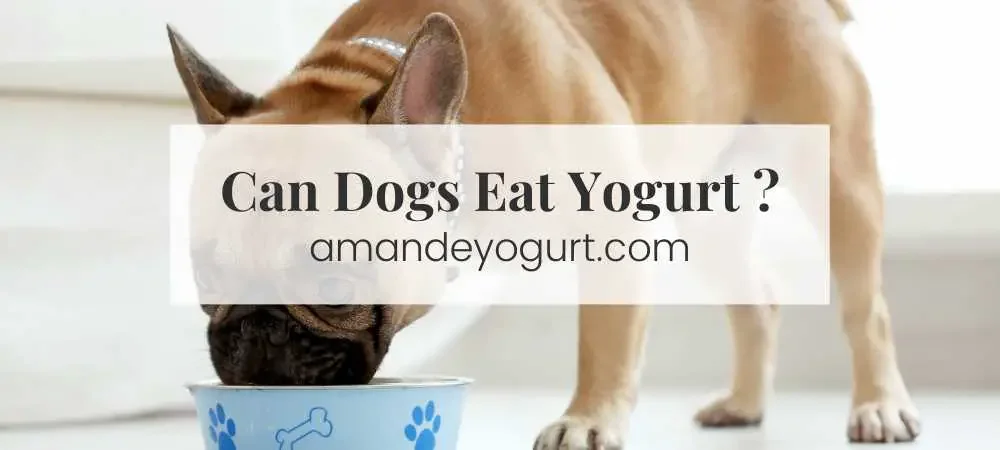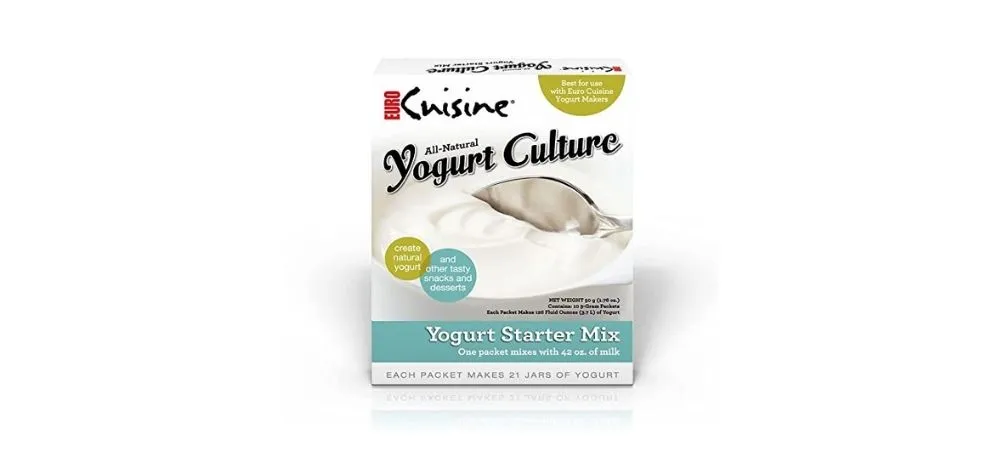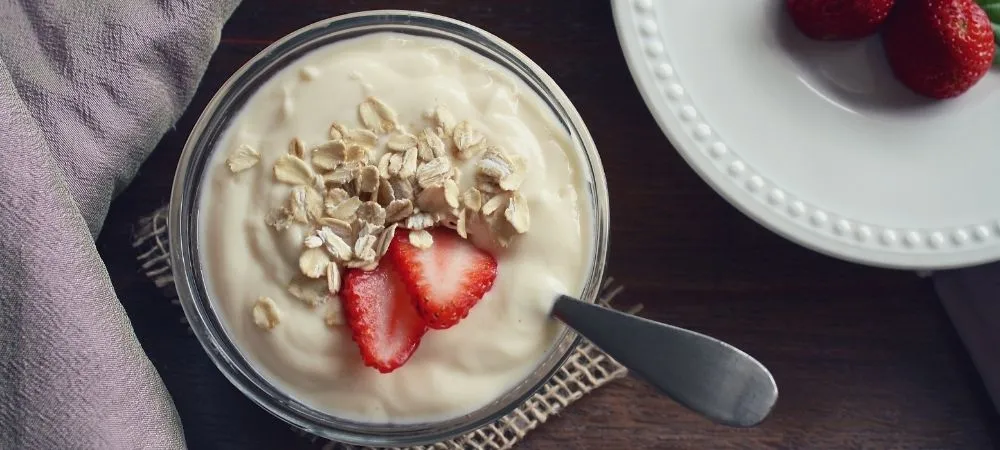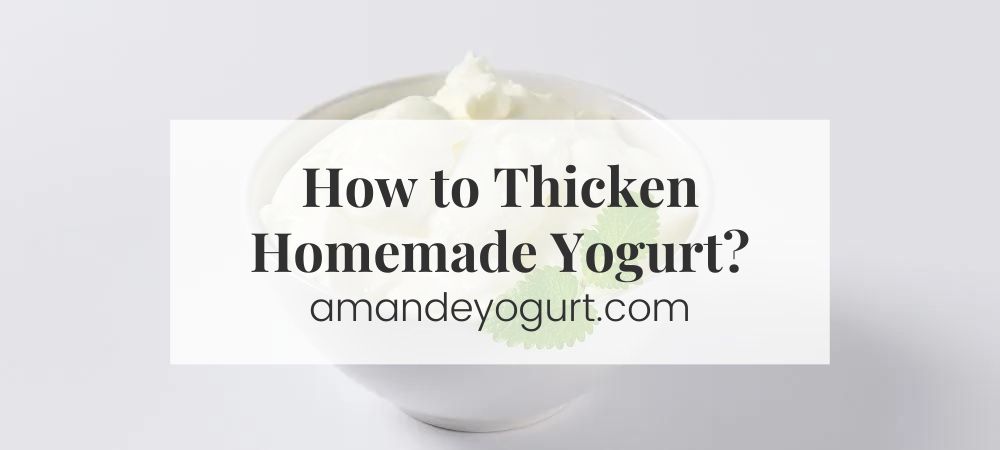Yogurts are not just a treat for humans, but dogs eat them too. Yes, dogs love yogurts as well. And if your dog has lactose intolerance, it is a safe bet for them. Yogurt is a protein-rich diet that is high in calcium as well. It aids digestive health benefits and boosts immunity.
Not just regular yogurts, Greek yogurt is a great option too. Most Greek yogurts are strained and hence low on lactose, liquid whey, and fat. You can feed xylitol-free Greek Yogurt to your dog safely. As Greek Yogurt is thicker in texture, your dog may like its texture too!
If you are wondering, Can Dogs Eat Greek yogurt?
The answer is dogs can eat Greek yogurt safely.
How to Feed Yogurt to Your Dog?
Dog eats yogurt as a treat, mixed into their food, or put into empty gelatine capsules for an easy-to-administer treat or supplement. If your dog is lactose intolerant, there are now many different types of yogurt that contain little to no milk at all. It’s also easy to find low-fat and even sugar-free varieties.
Let’s check out some of the best Yogurt treat deals for your canine:
- Yogurt Stick Himalayan Dog Chew
- Vitakraft Drops Dog Treats
- Fruitables Greek Yogurt Dog Treats
- Vitakraft Drops Dog Treats
- Whole Life Pet Products Food Topper
Yogurt Benefits to Your Pooch’s health
A natural probiotic that is great for the intestinal system, yogurt contains good bacteria that help restore balance to your dog’s intestines. This benefit also makes it useful in treating or preventing diarrhea.
Yogurt is an excellent source of calcium, which benefits dogs’ bones, teeth, heart function, muscle contractions and blood clotting.
Yogurt helps to relieve or reduce the symptoms of PMS in dogs because it contains B vitamins, calcium and tryptophan which are all good for your dog’s mood. Try giving her a spoonful when she seems to be feeling grumpy or depressed or is snapping at other animals.
Yogurt is also very useful in soothing the stomach after your dog has taken a trip to the vet and had diarrhea. If you are worried, Can dogs eat yogurt? The answer is Yes!
Prevention of Yeast Infections in Dogs
Feeding yogurt to your dog helps to prevent yeast infections because it contains beneficial bacteria that compete with yeast for dog food. This prevents yeast overgrowth which can result in excessive ear discharge, hot spots, and fungal infections.
Yogurt also helps to prevent UTIs since it contains calcium which hardens the bladder lining and reduces irritation. This benefit of yogurt is particularly useful in dogs who are susceptible to infection of the urinary tract due to a weak sphincter or other health issues.
Improves Digestive Health
Yogurt can prevent or reduce nausea and diarrhea by strengthening your dog’s immune system and increasing the number of beneficial bacteria in their intestines. Just make sure to use dog plain yogurt with active cultures, not one that contains artificial sweetener. Strictly avoid feeding your dog too much at once.
Yogurt is also high in tryptophan, which has a calming effect and can help to ease stress and anxiety.
Feeding yogurt to your dog can be an easy way to improve her overall health by giving her good bacteria that will help restore the natural balance of flora throughout her entire body.
The most important thing to remember is that the yogurt you feed your dog MUST contain live cultures, especially acidophilus and bifidus. Yogurt with no live cultures will not provide any of the benefits listed above.
It’s also best to choose low-fat yogurt because it is easier to digest than full-fat yogurt. Full fat dairy may interfere with the digestive system of your canine.
And if your dog is lactose intolerant, there are now many different types of yogurt that contain little to no milk at all. It’s also easy to find low-fat and even sugar-free varieties.
How to Choose Yogurts for Dogs?

Now we got the answer Can dog eat yogurt? Next comes, how to choose yogurt for them?
How to Choose Yogurt For Your Dogs?
Here are some factors you should consider before buying yogurt for your dog:
1. Free From Flavors
Always pick the yogurts, which are free from sweeteners and flavour. Plain yogurt is the best yogurt for your dog as the flavors ad sweeteners are toxic. Xylitol is one of the ingredients in flavored yogurt, which leads to a sudden drop in blood pressure and seizures.
Sucralose, aspartame, and Stevia are also not safe for your dog to consume. A plain and pure yogurt is the best deal for your dog.
2. Plain and Fat-free Yogurt
Fat-free or low-fat plain yogurts are best for dogs. Excess fat leads to weight gain and other health disorders in dogs, and thus full-fat yogurt is a strict no-no. It will be difficult for your canine to digest a full-fat yogurt. Always choose a low-fat yogurt as the safe bet for your dogs
3. Presence of Active Bacteria
Live active bacteria are best to aid digestion and improve the overall defense. Probiotic benefits are high in the yogurts with live active bacteria such as Greek-style yogurts. Especially if your dogs were on antibiotics, serving them probiotics is a good idea to improve their digestive health.
Ways to Add Yogurt to Your Dog’s Diet
There are many ways in which you can add healthy yogurt to your dog’s diet:
· You can top it up a teaspoon on the food.
· You can mix it in the food as an ingredient for making homemade dog food
· You can freeze the plain yogurt in an ice cube tray to treat your dog with freeze yogurt in summers
· 1-2 teaspoons of yogurt are recommended for the dog each day.
Is There any Hazard of Feeding Yogurt to the Dog?
Although plain yogurt is not toxic, yet your dog may find it difficult to digest. Once the dog crosses puppyhood, the dog’s body finds it difficult to digest the food with lactose. High lactose food generally causes diarrhea, gas, and vomiting. If you notice any of these symptoms after a yogurt diet to your dog, you should check with your vet immediately.
High-fat yogurt can upset the dog’s stomach. The dog can fall fatally ill and lead to health troubles like pancreatitis if the fat intake is high in its diet.
Artificial sweeteners like Xylitol are highly toxic for dogs and hence should b avoided.
Always start with small quantities when it comes to introducing new foods like yogurt. It helps the digestive system of the dog to adjust accordingly. Check the reaction of the dog after adding yogurt to its diet. If the dog is not having any digestive troubles, you can continue with that.
How much Yogurt should I feed to my Dog?
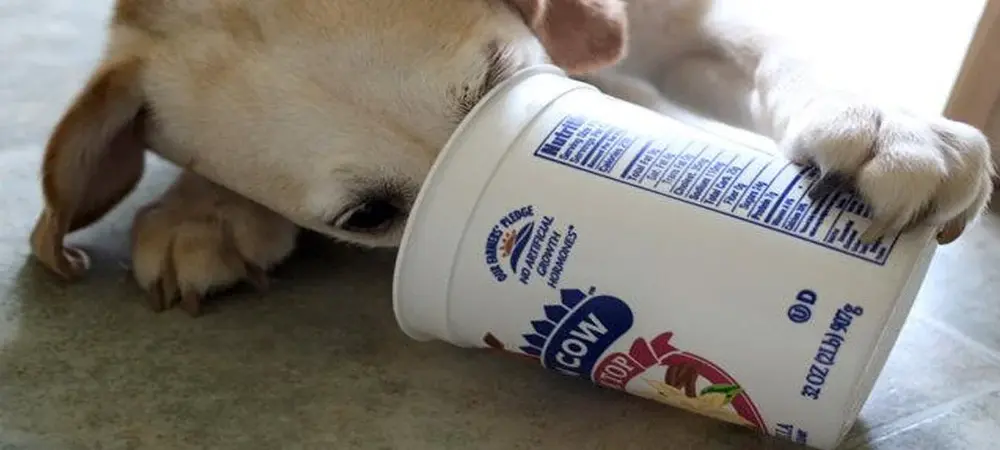
Feeding too much yogurt is not recommended. Hence, several factors influence the serving size of yogurt to your dogs, such as:
· Weight
· Neuter Status
· Daily Calories Intake
· Activity level
· Underlying health issue
· Size
After assessing the daily nutritional needs of your dog, you can determine the quantity of yogurt you can safely feed to your dog. Generally, 1-2 teaspoons are recommended for daily intake. In any case, yogurt consumption should not increase more than 10% of the total calorie intake of your dog.
Alternatives to yogurt for dogs
While yogurt can provide some benefits to dogs, there may be instances where it is not the best choice due to lactose intolerance, sugar content, or other concerns. In these cases, consider the following alternatives that can offer similar benefits without the associated risks.
A. Probiotic supplements designed for dogs
Probiotic supplements specifically formulated for dogs are an excellent alternative to yogurt. These supplements contain beneficial bacteria that support gut health, aid digestion, and boost the immune system. They come in various forms, such as capsules, powders, or chewable tablets, making it easy to find the right product for your dog. Consult your veterinarian to help you choose the most suitable probiotic supplement based on your dog’s age, size, and specific needs.
B. Dog-friendly treats and chews
Another alternative to yogurt for dogs is dog-friendly treats and chews that provide similar benefits. There are treats on the market that contain probiotics, promote dental health, or provide essential nutrients like calcium and phosphorus. When selecting treats for your dog, be sure to choose high-quality products made with natural ingredients and avoid those with added sugars, artificial preservatives, or other harmful additives.
C. Homemade dog treats with dog-safe ingredients
Making homemade dog treats with dog-safe ingredients is another way to provide your pet with healthy, nutritious alternatives to yogurt. By creating treats at home, you can control the ingredients, ensuring they are safe and appropriate for your dog’s dietary needs. For example, you can make dog biscuits using whole grain flour, pumpkin puree, and a small amount of natural peanut butter (without xylitol). This combination provides fiber, vitamins, and minerals without the potential issues associated with yogurt.
Is Greek Yogurt Safe for Dogs?
Yes, Greek yogurt is free from Xylitol and hence considered safe for dogs. As the Greek yogurt is thicker due to straining out of whey, it is likely more enjoyable for dogs. Other types of yogurt which are recommended for dogs are:
· Frozen yogurt
· Plain yogurt
· Naturally flavored
· Low-fat
Are the Probiotics Present in Yogurt enough for my dog?
No, as you cannot increase the yogurt in a dog’s diet for more than 10% of the total calories intake, you should refer your vet to explore the probiotic supplements for your dog. Probiotics are good for humans as well as for dogs too. But avoid over-feeding your dog with yogurt to complete its probiotic requirements as it may lead to digestive and other health issues.
Can Yogurt Kill a Dog?
Yes, if your dog is lactose intolerant, consumption of yogurt can even kill it. The yogurt containing Xylitol, an artificial sweetener, can also impact its health adversely, leading to death. It would be best if you were selective while buying yogurt for your dog. Especially if your dog is lactose intolerant, you should buy lactose-free yogurt. (Read: What is lactose-free yogurt)
What are the Probiotic Options Available for Dogs?
Some foods contain good bacteria aiding digestion. These foods are highly recommended for dogs to improve their health. Some of such foods are:
· Kefir or yogurt with live cultures
· Dog foods
· Capsules
· Powders such as Purina ProPlan FortiFlora
· Chews
Frequently Asked Questions
1. What kind of yogurt can I give my dog?
Some of the types of yogurt are:
· Non-fat Plain yogurt with live cultures
· Plain yogurt with live cultures and no artificial sweetener.
· Greek-style or Greek-type yogurt which is thicker due to straining out of whey. It contains more protein compared to regular or common yogurt.
· Flavored yogurts
· Vanilla-flavored yogurt
2. How much yogurt can a dog eat?
After assessing the nutritional needs of your dog, you can determine the quantity of yogurt you can safely feed to your dog. Generally, 1-2 teaspoons are recommended for daily intake. In any case, yogurt consumption should not increase more than 10% of the total calorie intake of your dog.
3. Is it OK to give my dog yogurt every day?
Though yogurt is good for dogs, using it as a substitute for regular meals might not be that great. You can feed your dog yogurt only in limited quantities. Using yogurt in excess will lead to diarrhea, vomiting and other digestive issues in dogs. Under no circumstances should you feed the dog with Xylitol-containing products. Always remember to keep your dog away from food that contains artificial sweeteners.
4. Is yogurt good for dogs?
Yes, yogurt is beneficial to dogs as it aids in digestion and boosts their immune system. It also helps fight diseases by improving the immunity of the dog.
5. What Happens If a Dog Eats Yogurt?
Yogurt is non-toxic but it may adversely impact the digestive system of your dog. As the dog’s body is not capable to digest the lactose much after puppyhood. It your dogs eat too much yogurt, it may cause vomiting, gas, and diarrhea.
Conclusion
It is not harmful to include yogurt in the dog’s diet. But if you suspect your dog of being lactose intolerant, avoid feeding it with yogurt. Also, make sure the type of yogurt you buy for your dog is free of artificial sweeteners like Xylitol. Keep a check on the quantity before introducing it to its diet. Increase the quantity gradually to avoid any digestive issues.
